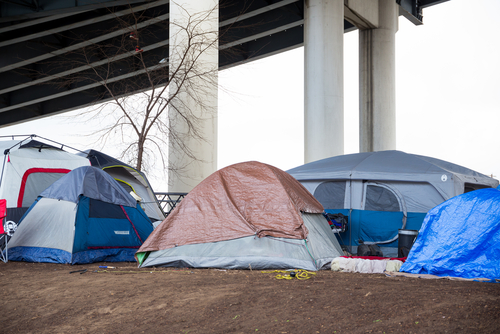Overuse of involuntary civil commitment as approach to homelessness debated by ABA House

Homeless camps with tents and tarp shelter under a bridge in downtown Portland, Oregon, in February 2016. (Photo from Shutterstock)
When addressing homelessness, governments should not expand their criteria for the involuntary civil commitment of people with mental disabilities, the ABA House of Delegates urged on Tuesday.
The House, which convened at the ABA Annual Meeting in Chicago, called on governments to instead increase funding for and accessibility to safe and affordable housing and community-based supports and services for this population.
“The population of unhoused people in many cities and jurisdictions is not solely comprised of people with mental health disabilities or substance use problems, but these groups are certainly represented in this population,” said Robert D. Dinerstein, the chair of the Commission on Disability Rights, who spoke in favor of Resolution 607. “While we all could and should be concerned about their situations, the answer to the problem is not to make it easier to involuntarily civilly commit them or charge them criminally.”
Despite U.S. Supreme Court rulings that require states to show a person is dangerous to themselves or others before involuntarily committing them, several jurisdictions have expanded or are seeking to expand their standards for committing individuals against their will, according to the report that accompanies the resolution.
This includes New York City, which gives certain authorities permission to remove a person who appears to be mentally ill and shows an inability to meet basic living needs—even in situations where they do not observe violent acts; and California, which recently broadened the definition by which someone can be deemed “gravely disabled” and committed for treatment.
“Even if one were not concerned about the overuse of involuntary civil commitment as a matter of due process or statutory protection, expanded use of involuntarily commitment is not effective,” Dinerstein added. “Individuals can be taken off the streets temporarily, but in most jurisdictions, there are not enough psychiatric hospital beds to serve them, so the people are released back onto the streets in a very short period of time. This process almost certainly leads to additional disruption in the lives of people who are hardly in need of additional barriers to their efforts to survive.”
Follow along with the ABA Journal’s coverage of the 2024 ABA Annual Meeting here.
Resolution 607 builds on a measure adopted by the House in 2023 that opposes any move to unreasonably limit an individual’s right to make decisions about his or her own medical care, the report says.
The resolution passed but was opposed by some members who argued it was overly broad and could create barriers to the treatment of individuals with severe mental disabilities.
“Many mentally ill people are not homeless,” said Mark Alcott, a New York City lawyer and a past member of the Board of Governors. “They have homes; they have families; they have spouses; they have friends who dearly love them but are incapable of caring for them because of the impossible burden of dealing with someone with severe schizophrenia, mania, psychosis or other unfortunate mental health conditions.
“These people need to be treated medically. They need to be hospitalized, whether voluntarily or not, and this proposal makes it harder to do that.”
Resolution 607 was submitted by the Commission on Disability Rights and supported by the Section on Civil Rights and Social Justice, the Forum on Affordable Housing and Community Development Law, and the Commission on Homelessness and Poverty.
See also:
Supreme Court will consider whether criminalizing homelessness violates Eighth Amendment
Supreme Court upholds ban on sleeping in public, says law does not punish status of homelessness
Write a letter to the editor, share a story tip or update, or report an error.



